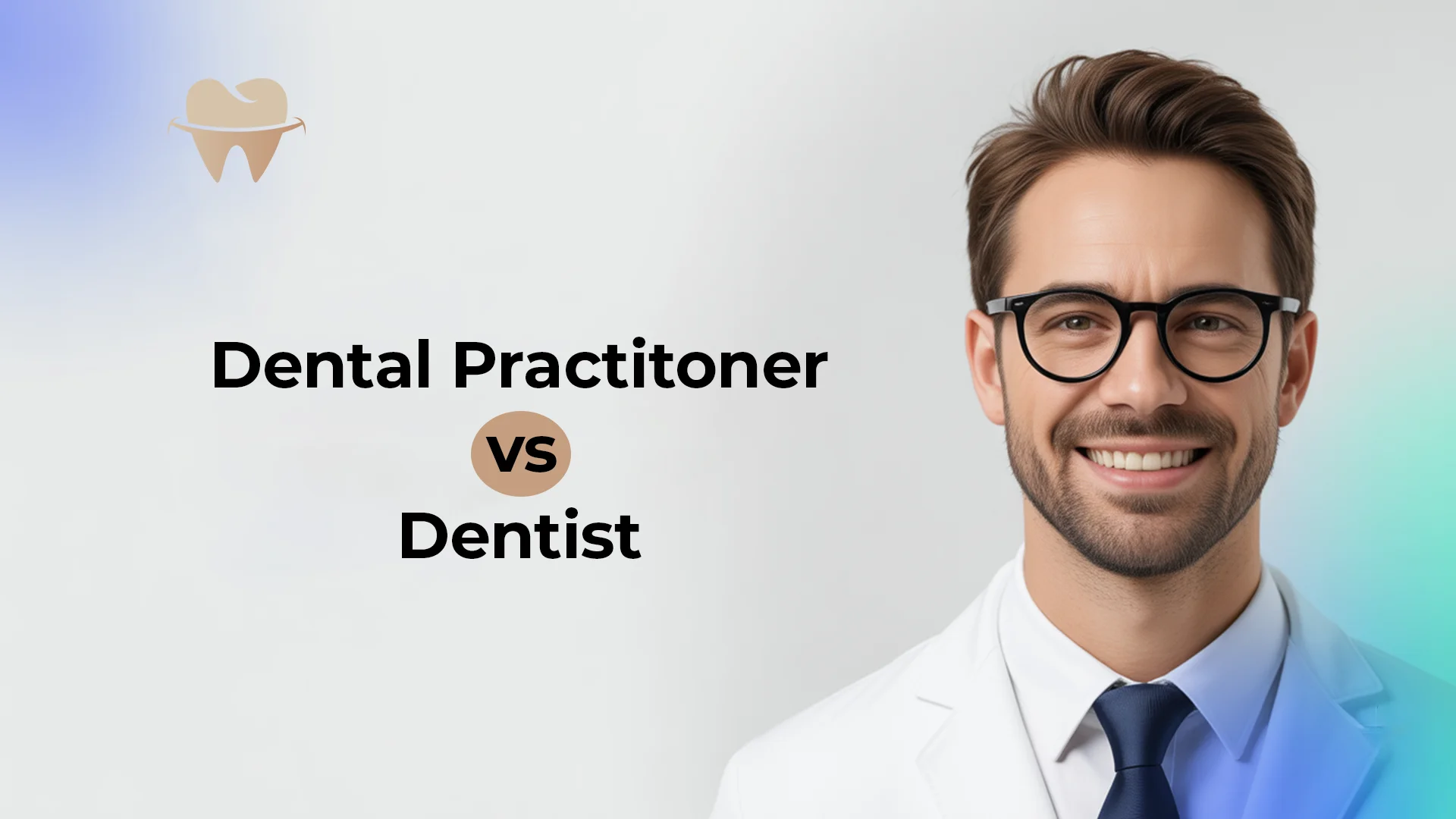Some people say “dentist” when talking about their teeth and gums, while a few others refer to “dental practitioners.” Ever wondered why there is a difference in terms for the same profession? Here’s the surprise: that tiny difference in wording can affect the kind of dental care you receive.
Much of the global population presently visits dental professionals every year. But many still don’t fully understand the difference between the professionals they’re booking an appointment with. This small difference can shape your experience, your treatment plan, and even your smile’s future.
Let’s break it down in this article in the simplest way possible and understand how it brings an impactful difference.
Understanding the Basics
Before diving deep into the differences between the two, let’s have a quick understanding of the two roles.
Dentist
A dentist is a licensed oral care professional who diagnoses, treats, and manages oral health issues. These individuals go through a step-by-step journey to get licensed to practice their profession. They complete a dental degree, pass rigorous exams, and get registered with a dental board or council in their country.
Dental Practitioner
A dental practitioner, on the other hand, is a comparatively broader term. This term encompasses a range of dental care professionals. These include dentists and also other qualified dental professionals, such as:
- Dental therapists
- Hygienists
- Prosthetists
- Oral health therapists
Simply speaking, all dentists are dental practitioners, but not all dental practitioners are dentists.
Dentist vs Dental Practitioner: Key Differences
Now, let’s move on to exploring the key differences between these two medical professionals.
1. Education and Training
Although both dentists and dental practitioners undergo proper training and education to become licensed professionals, the duration of their tenure varies.
Dentist – These individuals usually complete a 4–5 year university degree in dentistry, which covers everything from anatomy and oral surgery to prosthetics and orthodontics. After graduation, they must be licensed and may even choose to specialize.
Dental Practitioners – These professionals may have different training lengths based on their particular role. For example:
- Dental hygienists focus on preventive care, often completing a 2–3 year diploma or degree.
- Dental therapists often work with children, providing fillings, extractions, and preventive education.
- Dental prosthetists create dentures and mouthguards.
2. Scope of Work
Despite the professional similarity, dentists can do almost everything a dental practitioner does, but not vice versa. Some tasks are limited to the dentists alone.
The working scope of dentists includes:
- Diagnosis of oral diseases
- Performance of surgeries (like extractions)
- Treatment of advanced dental problems (tooth implants)
- Prescribing medications
Other dental practitioners might:
- Clean teeth and remove plaque
- Black stain removal from teeth
- Apply fluoride treatments
- Fit dentures or mouthguards
- Educate on oral hygiene
The Impact of Difference on Your Experience
Despite the subtle difference between the two oral care practitioners, the impact is big. The difference can affect your waiting times, costs, and treatment outcomes.
It’s important that you have done your homework before going for the treatment. Seeing the right professional from the start means:
- Faster solutions – You can avoid unnecessary referrals.
- Lower costs – Some procedures done by hygienists or therapists may cost less than if a dentist does them.
Which One Should You See?
After understanding how the two differ and how they can impact your experience, we’ve got one more major question to address: Which one should you choose for your dental treatment?
Thinking of it this way can help give you the answer you seek:
- For regular check-ups, cleaning, and preventive care, a hygienist or oral health therapist could be a better choice. Not only will it save you time but also be light on your budget.
- For pain, suspected cavities, or complex issues, you should consider going to a dentist directly.
Many of the best dental clinics in Lahore and throughout the country have both dentists and other dental practitioners working together. Such a team approach ensures that you get the right care from the right person — that too in a single visit.
Myths About the Terms
Considering the qualification differences between a dentist and a dental practitioner, certain myths do prevail in the population. Let’s have a look at some of these:
- Myth 1: Dental practitioners are less qualified than dentists.
This is not true. These professionals are trained for their specific roles and are experts in that particular scope. - Myth 2: Only dentists can properly clean teeth.
Dental hygienists do many cleanings, and they do it exceptionally well. - Myth 3: Dental practitioners cost less because they’re “junior.”
Pricing depends on the treatment, not the title.
Key Takeaway
“Dentist” and “dental practitioner” aren’t the same; each offers different expertise. A hygienist keeps your teeth clean, while a dentist handles complex treatments. Choosing a clinic with both ensures you get preventive care and advanced procedures as needed.
So, the next time you book, note who you’re seeing; that small difference can affect your care, costs, and comfort, ensuring you get the right help at the right time. Clinics like Teeth and Gums Dental Clinic are places where you can easily receive the best dental care.
Frequently Asked Questions
Are dental practitioners and dentists the same?
Not exactly. All dentists are dental practitioners, but not all dental practitioners are dentists.
Can a dental practitioner do fillings?
Some can, like dental therapists, but it depends on their training and regulations in your region.
Who should I see for a toothache?
A dentist is best, as they can diagnose and treat complex issues causing pain.


0 Comments